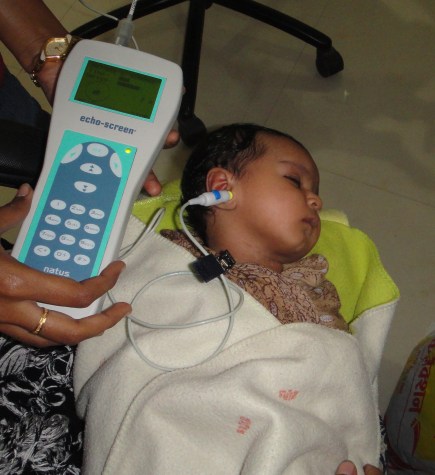Ear infections and speech development: good news for youngest kids, but parents still have plenty to fret about.
Although a new study published in Pediatrics shows a sharp decline in the rate of childhood ear infections among kids in the first year of life, there are still plenty of children (and parents) who have to struggle through an ailment that remains stubbornly common — and, if left untreated, ear infections affect speech, lead to hearing loss or an overall delay a child’s speech and language development.
Stine Jewett, a mother of two who lives with her husband near San Francisco, knows all about the trials that come with recurrent ear infections. Last year, her son, Thomas, developed an alarming streak of ear infections at the rate of one almost every other month. According to the  meticulous records she kept of Thomas’s condition, Jewett says that her son suffered from five incidents of acute otitis media — the common ear infection — in less than one calendar year.
meticulous records she kept of Thomas’s condition, Jewett says that her son suffered from five incidents of acute otitis media — the common ear infection — in less than one calendar year.
“It would always happen on the weekend,” Jewett recalled. “There would be no symptoms leading up to it and then, always early Saturday night, going to get the ear drops.”
At the beginning of this period, Jewett says that she and her husband had no idea what they were in for. Their other child, an elder daughter named Anna, had never come down with an ear infection in her entire life. Also, Thomas’s age made him a bit old to be so vulnerable to ear infections, not to say a long and — for his parents — bewildering series of them.

Stine Jewett and her son Thomas
“Whenever I saw a runny nose, I would worry,” Jewett said. “What was most puzzling was that he didn’t start getting them until he was three. Most kids start getting them around one. He never had any until he was three, and so it was not a typical case. The doctors really didn’t have anything to say.”
And, after a while, Jewett ran out of patience with the antibiotic remedies that Thomas’s physicians were prescribing. After some initial reluctance, she opted for a procedure that involved putting her son under total anesthetic and inserting tubes in his ear canals, so that the middle part of that organ can drain the fluids that cause infections in the first place.
“I was hesitant,” she recalled. “I actually wanted to avoid [the tubes] for some reason. In surgery, they put him completely under so that he will lie still. But that’s only for children. An adult getting this would not be under. So that was scary. But what basically pushed me over was, ok, he’s on antibiotics again. Is he going to get resistant to antibiotics? What if he gets really, really sick. A friend who was an ENT was like, just do it. Now I wish we had done it sooner. Looking back, I feel bad that I thought he was just being difficult or grumpy.”
Ear Infections Affect Speech and Language Development
In the days just before his surgery, Thomas was tested by an audiologist who found enough congestion to account for low hearing loss in the boy’s left ear and moderate to severe hearing loss in his right. The severity of hearing loss can fluctuate, however, due to the varying levels of fluid build up, which can make it even more difficult for parents who are trying to figure out their child’s inflamed level of irritability or grouchiness. A person speaking in a clear, normal voice will sound like a whisper to a young child with enough congestion to block the normal passage of sound waves.


